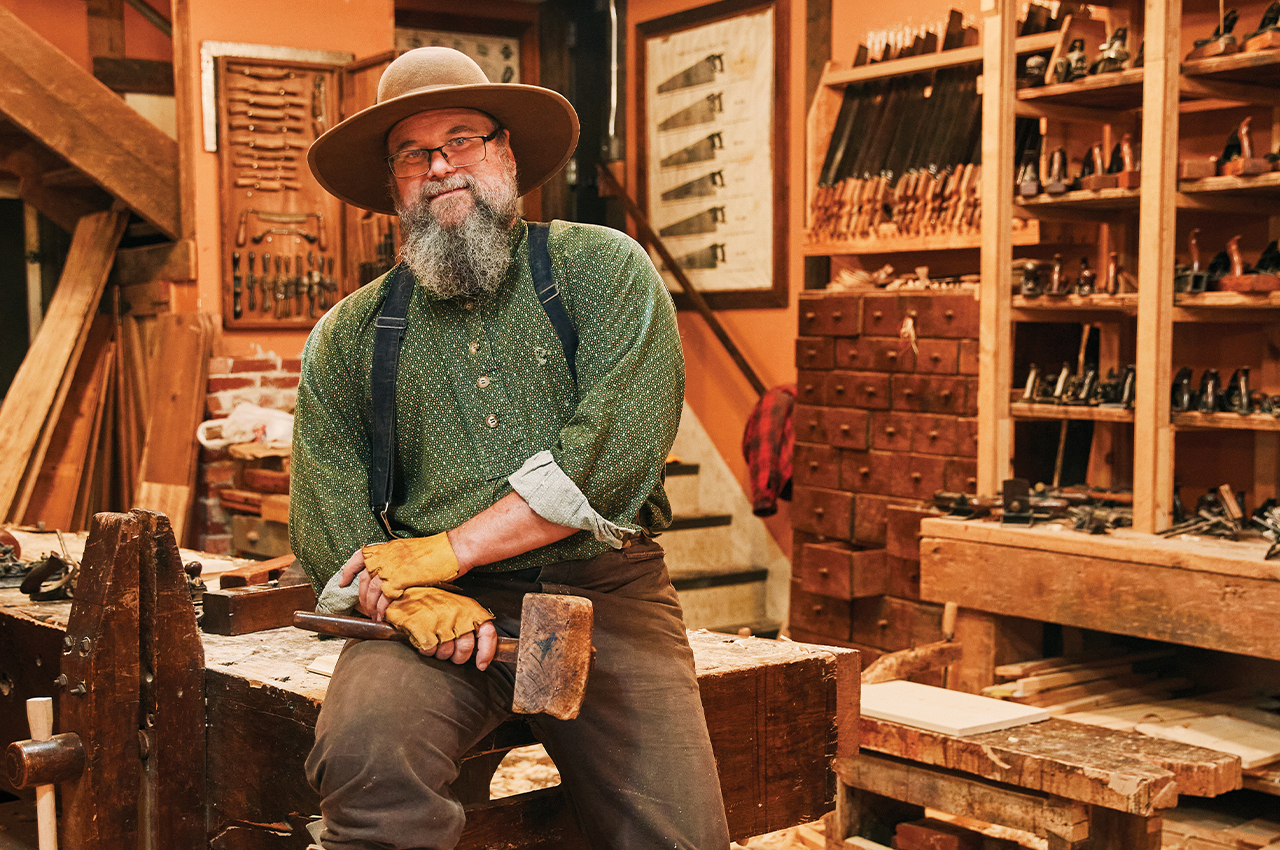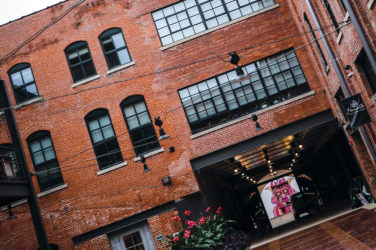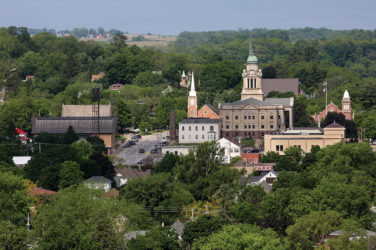Robby Pedersen can show and tell you all about the woodworking business in small-town Iowa, before trains brought factory-made goods from the East Coast.
Writer: Brianne Sanchez
Photographer: Joe Crimmings
Small towns become destinations when residents with a vision decide to do something different.
Case in point: Jefferson, Iowa, population 4,182. Wander through the picture-book-inspired Imagination Alley, peer at rooftop murals from the Mahanay Memorial Carillon Tower, or order lunch at the Centennial to get a real taste of the community’s creative ideas.
Just steps off the square, a carved wooden sign announces RVP-1875. Owned and operated by master furniture maker Robby Pedersen, the brick warehouse is part showroom, part workshop, part museum, an occasional performance venue and Pedersen’s home. When the front doorbell rings, he puts down the hand plane he uses to smooth boards and offers a tour.
“This is the world’s leading historical furniture shop,” Pedersen says, dressed as if Samuel J. Kirkwood still governed the state. “Everything we make here is based on the year 1875.”
RVP-1875 is a portal into the past and a prime example of how the most interesting places are populated by people who share their passion with others. Not everyone can commission Pedersen to make a table or dresser, but he wants each visitor to understand why he’s carrying on a cultural tradition. Furniture can offer clues into the past: the economics of how our ancestors lived and what they valued.
“I’m telling the history of our country through my trade,” he says.
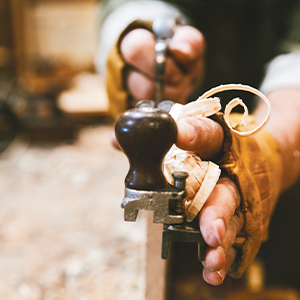
Step into RVP-1875 in Jefferson and back to a time when woodworkers made furniture by hand.
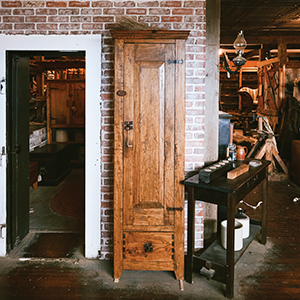
DUSTING OFF LOST TRADITIONS
According to Pedersen’s research, 2,013 furniture makers were working in Iowa in 1875. Factory manufacturing and railroad access would eventually transform the industry, but furniture often weighed too much for settlers to bring in wagons, so most preferred to buy it locally. Furniture makers were in demand in the agricultural communities across the Midwest.
“People come in all the time and ask, ‘Why didn’t the farmer just build his own furniture?’” Pedersen says. “Back then, the whole thought was, ‘If I have an extra hour in the day, I can plow another acre.’ They focused because they knew they had to spend a lifetime to get fast enough and good enough at something to make a living.”
Fresh wood shavings litter the floor in the far corner of RVP-1875. Many are from Iowa-hewn trees like catalpa, oak and walnut. Pedersen uses tools, techniques and finishes from a time when families prioritized function over fashion in furnishing their homes. This isn’t to say his bespoke beds, custom cupboards and made-to-order tables aren’t as handsome as they are sturdy. As Pedersen puts it, “Stronger rather than fancy was the point.”
A trade secret that he’s spent more than three decades decoding and perfecting is a system of triple-locking joinery that died out along with the master craftsmen of the pre-industrial era. He demonstrates the reinforcing technique with dovetailed pieces of wood he keeps handy.
“There are no books about how to make a piece of furniture pre-1900,” he says. “So, how do you figure it out? You crawl under every table. You go to auctions and antique stores and look at the old stuff that survived. Why did it survive?”
Pedersen, a Jefferson native, got his start at Living History Farms before moving back home to have more space to branch out. He makes about 70 pieces a year here, often chatting with casual browsers who mistake the pieces on the shop floor for antiques. He hosts occasional tour groups and workshops for people who want to learn more.
These days, anyone with access to power tools and online tutorials can attempt to make furniture. Pedersen’s personal interest in reviving traditions in his hometown stems from a commitment to authenticity.
“If I’m in charge of telling the story of hundreds of years of tradition of this proud and noble trade, I can’t be pretending,” he says. “Only the guy who’s done it every day, all day, for years should be able to speak on that topic.”
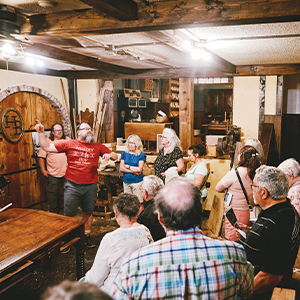
Robby Pedersen often shows groups around his shop, where every tool has its place — including a row of wooden mallets.
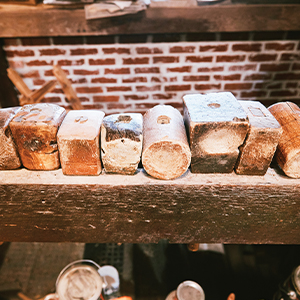
CARRYING A CULTURAL LEGACY
The anachronistic approach at RVP-1875 might seem to contradict Jefferson’s reputation as a high-tech hub off Highway 30. The city has some of the fastest internet speeds in Iowa and a Gravitate coworking space for remote workers. But in this Main Street community, preservation is important, too.
“We believe we’re one of only four communities in the state that has our historic downtown still intact,” says city council member Matt Wetrich.
He runs Experience Jefferson, which promotes community vitality. He says public-private partnerships have played a significant role in the town’s rural revival, but individuals have made a big impact, too.
“You can have a lot of people who have good ideas, and you can have people who want to see things happen, but it really takes a handful of people who are brave and passionate to try new things,” he says. “I like to say that visitors here can go up the tower, around the square and back in time.”
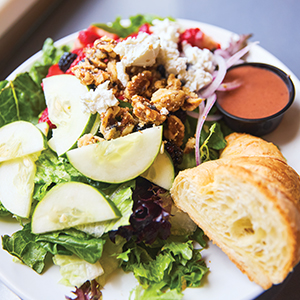
DESTINATION DINING: THE CENTENNIAL
After Jefferson’s beloved tearoom flooded and the historic building closed a few years ago, community members wondered who would restore the vital corner restaurant.
A group of 72 local women decided to work together to save the building. They call themselves “Why Not Us” because they realized they could be the investors they were waiting for. Shareholders pooled their resources, applied for Main Street Iowa grants and loans, and celebrated the Centennial’s opening in July 2022.
Chef Sara Ostrander, a culinary graduate from Greene County, runs the restaurant. Her rotating, hand-crafted seasonal lunch menu draws locals and out-of-towners alike.
Hours: 11 a.m.-2 p.m. weekdays
100 E. State St., Jefferson
(515) 386-3888
Reservations are recommended


